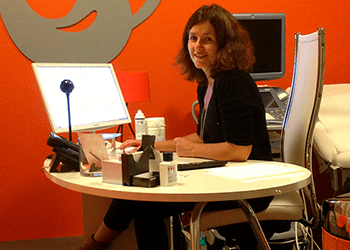Screening and prevention during the first trimester
In most cases, the first trimester ultrasound scan provides reassuring results and confirms a healthy pregnancy. It is important to remember that only 3 to 5% of babies will show signs of abnormalities and only 5 to 10% of mothers-to-be will experience complications, primarily pre-eclampsia, gestational diabetes or premature labour.
Problems are therefore rare but serious and our aim is to screen for them early during the first trimester ultrasound scan, which is usually performed around 12 weeks pregnant.
We want to reassure mothers-to-be with a low-risk pregnancy as early as possible while providing appropriate care to those with a high-risk pregnancy as quickly as possible. Our top priority is making sure you have peace of mind and everything you need to know about your pregnancy as soon as possible.
In 2009, our ultrasound centres started working in close collaboration with gynaecologists and midwives. As a result, our strength lies in our multidisciplinary expertise, we work within an extensive network of private and hospital specialists, including paediatric cardiologists, geneticists, paediatric radiologists, paediatricians, neonatologists, paediatric surgeons, internal medicine doctors, diabetologists, paediatric psychiatrists and psychologists. We also work closely with the maternity units of the Lausanne and Geneva University Hospitals as well as with private maternity facilities.
Objectives
Objectives of the first trimester ultrasound scan:
- create the parent-baby bond
- check healthy foetal development
- check how many weeks pregnant you are and work out your due date to within five days by measuring your baby’s crown-rump length (from top of head to bottom)
- screen for morphological or anatomical abnormalities (many are already visible at this early stage)
- screen for multiple pregnancies (twins, triplets) and check if there is one placenta (monochorionic pregnancy) or each baby has their own placenta. There are increased risks with having a monochorionic pregnancy and you will need ultrasound monitoring every two weeks
- screen for placental abnormalities, such as placenta accreta (when the placenta attaches too deeply to the wall of the uterus; scarring from a previous caesarean section is one of several risk factors)
- Two risk calculations are made in order to:
- screen for trisomy 13, 18 and 21. The risk calculation for trisomy 13, 18, and 21 is based on your age, your baby’s nuchal translucency measurement and a blood test (Beta-HCG and PAPP-A serum marker levels)
- screen for patients at risk of pre-eclampsia and intrauterine growth restriction (IUGR). The risk calculation for pre-eclampsia and IUGR is based on your blood pressure and uterine artery blood flow (using a Doppler ultrasound scan) as well as a medical questionnaire and blood test (placental growth factor levels)
Your results
You will leave with all your results
Our EchoFemme ultrasound centres offer a single, comprehensive assessment to ensure you receive your risk calculations on the same day as your ultrasound scan.
In order to have your results on the day of your ultrasound scan, a blood test for serum marker and placental growth factor (PlGF) levels will need to be taken two to three days before your appointment at our EchoFemme ultrasound centre.
Your doctor will refer you for a blood test. Your ultrasound pictures will be sent directly to your email address.

Your appointment
Before your appointment
- Remember the examination form for the EchoFemme ultrasound centre provided by your doctor.
- Avoid applying creams, oils or shower gel to your stomach five days before your ultrasound scan.
- If you would like to receive your trisomy and pre-eclampsia results on the day of your ultrasound scan, you will need to have a blood test for serum markers two to three days before your appointment at our EchoFemme ultrasound centre and ask the laboratory to send our team a copy. This means that you will be able to have your trisomy and pre-eclampsia results straight away. If the results show an increased risk of trisomies, non-invasive prenatal testing (NIPT) can be carried out the same day by your doctor or our EchoFemme ultrasound centre. If the results show an increased risk of pre-eclampsia, you can start to take aspirin immediately (provided that there are no contraindications).
- If possible, please do not bring your children with you to your appointment: the examination is long and we need your full attention.
- Make sure you have an email address where you would like your ultrasound pictures to be sent.

Why is it best not to bring your children with you?
An ultrasound scan requires our full attention and we need to be focused and responsive in order to accurately check dozens of vital parameters that concern your baby. We understand that young children do not often want to sit still and quiet for up to 40 minutes and, as a result, they can distract us from our important task. They can also compete for your attention when you need to be calm and listen carefully to important medical information. Thank you in advance for your understanding.
Make an appointment
Rive Droite centre: La Tour EchoFemme Ultrasound Centre
- Telephone : +41 (0)22 719 79 79
Rive Gauche centre: Rive EchoFemme Ultrasound Centre
- Email : echofemme@latour.ch
Trisomy
There are several types of trisomy, however the most common are trisomy 13, 18 and 21. Trisomies are characterised by the presence of an additional chromosome in the nucleus of every cell in the body, which creates different abnormalities in how the cells function. In the vast majority of cases, these chromosomal conditions are not inherited.
Trisomy screening using the first trimester risk calculator
This test estimates your risk of having a baby with a chromosomal condition and is performed during a single appointment at our EchoFemme ultrasound centre using three criteria:
- your age: the older you are, the more the risk increases
- nuchal translucency (collection of fluid under the skin behind the baby's neck): as nuchal translucency size increases, the chances of a chromosomal abnormality increase
- a blood test to determine the levels of two serum markers called Beta-HCG and PAPP-A
This blood test will ideally be carried out by your doctor or the laboratory two or three days before your appointment, so that we can give you all your results on the day of your ultrasound scan. Alternatively, the blood test can be taken at our EchoFemme ultrasound centre during your ultrasound scan and you will receive the results in two to three days.
Our team then uses the three criteria to work out your risk calculation:
- risk lower than 1 in 1,000: low risk. We do not recommended further testing. Non-invasive prenatal testing (NIPT), based on a blood test that analyses small fragments of foetal DNA circulating in the mother's blood, is available if you would like to explore this option. However, if you have a low risk, the cost of this examination (500 to 800 CHF) will not be covered by your health insurance
- risk between 1 in 50 and 1 in 1,000: moderate risk. We recommend NIPT (covered by health insurance)
- risk higher than 1 in 50: increased risk. We recommend NIPT or an invasive test (chorionic villus sampling and/or amniocentesis). You will have genetic counselling before this type of procedure
- risk higher or equal to 1 in 10: major risk. We recommend an invasive test from the outset
When the risk is considered as moderate and above, NIPT is covered by health insurance. When the risk is higher than 1 in 300, invasive tests are also covered by health insurance.
Non-invasive prenatal testing
Trisomy screening using non-invasive prenatal testing (NIPT)
NIPT is a blood test based on the presence of foetal DNA in the mother’s blood and enables babies with an increased risk of trisomy 13, 18 or 21 to be screened. NIPT is a fast, reliable and safe technique. It has 99% accuracy in detecting chromosomal abnormalities while reducing the need for invasive tests (chorionic villus sampling and amniocentesis). NIPT is therefore not a 100% accurate diagnostic test. It is a very good screening test but may be wrong in rare cases. Only invasive tests (chorionic villus sampling and amniocentesis) are completely accurate.
Low-risk NIPT
In the vast majority of cases, and taking into account the results of your risk calculation, you will receive reassuring results.
In the event of low-risk NIPT, there is the rare possibility that NIPT is wrong and a chromosomal abnormality is present (false negative).
High-risk NIPT
A chromosomal abnormality is strongly suspected and chorionic villus sampling or amniocentesis must be performed to confirm the NIPT results.
In the event of high-risk NIPT, 0.3% of cases are a false alert (false positive) and NIPT shows a high risk of a trisomy when your baby has no chromosomal abnormalities. An invasive test (chorionic villus sampling or amniocentesis) will still be carried out when NIPT is positive and we will ensure you are updated as quickly as possible.
NIPT
- is covered by your health insurance if your risk calculation for one of the three trisomies shows you have a moderate or increased risk. If your risk calculation shows a low risk of a chromosomal abnormality but you would like NIPT, the test costs approximately 500 CHF
- does not replace the first trimester ultrasound scan and the risk calculation for trisomy 13, 18 and 21. In fact, this first ultrasound scan is used to identify many other conditions than chromosomal abnormalities and remains an essential tool for pregnancy monitoring
- can detect other abnormalities than trisomy 13, 18 and 21. A more comprehensive NIPT option is available, however you will need to pay for the additional cost (300 CHF if you have a moderate or increased risk calculation, and approximately 800 CHF if your risk is low)
Chorionic villus sampling and amniocentesis testing
Trisomy diagnosis using invasive tests: chorionic villus sampling and amniocentesis
Invasive tests diagnose trisomies as well as many other genetic abnormalities. They accurately determine the presence of genetic abnormalities.
Chorionic villus sampling involves taking a small sample of cells (chorionic villi) from the placenta using a needle. This test is invasive but has the advantage of being able to be performed very early, between 11 and 14 weeks pregnant, unlike amniocentesis, which involves removing and testing a small sample of cells from amniotic fluid and can only be performed from 16 weeks pregnant.
After the chorionic villus sampling or amniocentesis procedure, the cell sample will be analysed in the laboratory to determine the karyotype (collection of chromosomes) or to look for duplications and microdeletions (array-cgh). Exome sequencing, a test used to identify possible disease-causing genetic mutations, is also available. Results are available in one day for trisomies and sex chromosome abnormalities, seven to ten days for array-cgh and several weeks for exome sequencing.
Amniocentesis may be recommended after chorionic villus sampling if results need to be confirmed.
The good news is that chorionic villus sampling and amniocentesis carry less risk than once previously thought and the risk is considered negligible if testing is carried out by an experienced doctor. Please note that chorionic villus sampling is potentially safer than amniocentesis.
When the risk is higher than 1 in 300, invasive tests are covered by health insurance.
Pre-eclampsia
Pre-eclampsia usually occurs at the end of the second trimester or during the third trimester. This condition is particularly characterised by high blood pressure (hypertension), which may have serious consequences for both mother and baby. There is unfortunately no treatment for pre-eclampsia once it has developed. Pre-eclampsia can only be cured by giving birth, resulting in premature labour that may be very early or extremely early.
Fortunately, it is possible to effectively prevent pre-eclampsia that appears before 37 weeks pregnant and ensure the condition does not develop. To do this, you must start taking a daily dose of 150 mg of Aspirin before 16 weeks pregnant and continue this preventive treatment throughout pregnancy (up to 36 weeks). Treatment will unfortunately have no effect if it is started after 16 weeks pregnant. This is why it is so important to screen for mothers-to-be who are at risk of pre-eclampsia during the first trimester ultrasound scan, which is performed a month before, at around 12 weeks pregnant. This also applies to intrauterine growth restriction. We perform a risk calculation for pre-eclampsia to ensure mothers-to-be receive appropriate preventive measures.
Risk calculation
Screening for pre-eclampsia and intrauterine growth restriction (IUGR) using the risk calculator
This risk calculator estimates your risk of developing pre-eclampsia and is performed during a single appointment at our EchoFemme ultrasound centre using four criteria:
- a medical questionnaire to screen for risk factors:
- if your mother had pre-eclampsia
- if you have previously had pre-eclampsia or a low-birth weight baby
- if you smoke
- if you have type 1 diabetes
- if you have chronic hypertension
- if you have lupus
- if you have antiphospholipid syndrome
- method of conception (in vitro fertilisation)
- your blood pressure
- your uterine artery blood flow (using a Doppler ultrasound scan) during the main ultrasound scan
- a blood test for placental growth factor (PlGF) levels, which must be carried out after 11 weeks and before 14 weeks pregnant (your baby must measure at least 45 mm for the blood test)
This blood test will ideally be carried out by your doctor or the laboratory two or three days before your appointment at our EchoFemme ultrasound centre at the same time as your trisomy blood test. This means that we can give you all your results on the day of your ultrasound scan. Alternatively, the blood test can be taken at our EchoFemme ultrasound centre during your ultrasound scan and you will receive the results in two to three days.
Our team then uses the four criteria to work out your risk calculation:
- risk lower than 1 in 1,000: low risk of pre-eclampsia or IUGR before 37 weeks pregnant: aspirin prophylaxis is not required and we recommend standard monitoring.
- risk higher than 1 in 100: increased risk of pre-eclampsia or IUGR before 37 weeks pregnant: in this case, and in the absence of any contraindications (allergy), we recommend prevention by low-dose aspirin (150 mg at night until 36 weeks pregnant) in line with simple guidelines provided, in order to significantly reduce the risk of pre-eclampsia.
